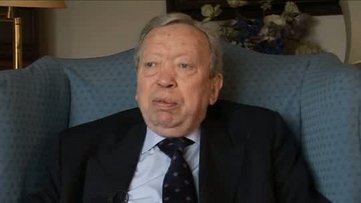NEXT STORY

Keeping up with old friends from Oxford
RELATED STORIES

NEXT STORY

Keeping up with old friends from Oxford
RELATED STORIES


|
Views | Duration | |
|---|---|---|---|
| 1. Beginnings | 2 | 576 | 06:25 |
| 2. Two masters at school who had enormous influence on me | 258 | 05:19 | |
| 3. My overriding ambition to be President of the Oxford Union | 280 | 07:53 | |
| 4. Lucky rather than privileged | 218 | 01:51 | |
| 5. Keeping up with old friends from Oxford | 235 | 02:24 | |
| 6. Advantages of being a public school boy in the army | 231 | 05:08 | |
| 7. Humiliation of the British defeat at Suez | 210 | 06:04 | |
| 8. Turning down a job offer from Lord Beaverbrook | 155 | 06:50 | |
| 9. Feeling homesick while on the Harkness Fellowship | 141 | 07:27 | |
| 10. Owing a lot to Alastair Hetherington | 111 | 06:59 |

I don’t think I felt I was a privileged person at all because certainly at Christ Church, there were all these wealthy Bullingdon, sort of, Hooray Henries and all these old Etonians and stuff, and you know, they drank champagne and made an awful noise and in… what’s that famous…? Oh dear, my mind’s going. The famous quad. But I don’t think I did. Also… you see, and I was brought up always… I mean, my dad was a parson. We didn’t have much money. Certainly didn’t have grand holidays or anything like that and most of the time when I was at school at Westminster, you know, the other boys were much richer than I was. And it’s perfectly true that I did have a very lucky upbringing and I went to Westminster School and I then went on to Christ Church, Oxford but I think I was very conscious of being the poor parson’s son. Indeed, at the first school I went to, Highgate School in North London, they used to yell ‘Charity Boy’ at me and I don’t know what that meant because I wasn’t. I think my dad paid normal fees. They weren’t very high in those days. But ‘Charity Boy, Charity Boy’, because my dad was a vicar and he happened to be vicar of the local parish. So I don’t think I came out with any great feeling of being over-privileged and compared with the people I was mixing with, I certainly wasn’t. Though, of course, compared with the broad mass of the population, I had it very easy and I had it in, I suppose, a very privileged way. Public school, Christ Church, all the rest of it. But it didn’t sort of eat me up and I think I just felt that, you know, whereas other people went off on skiing holidays and rode horses, I’d never ridden a horse in my life, I’d never been skiing in my life, for that matter. So you didn’t feel that you belonged to the privileged class, really.
A distinguished British political observer, Anthony Howard (1934-2010) wrote for 'The Guardian', 'The Sunday Times' and 'The Observer' for over 40 years, during which time he has commented on the historical significance of global political issues. He was also editor of 'The Listener' and 'The New Statesman', and a reporter on both 'Newsnight' and 'Panorama'. He was awarded the CBE in 1997.
Title: Lucky rather than privileged
Listeners: Christopher Sykes
Christopher Sykes is a London-based television producer and director who has made a number of documentary films for BBC TV, Channel 4 and PBS.
Tags: Christ Church College, Oxford University, Bullingdon Club, Westminster School, Highgate school, Etonians
Duration: 1 minute, 51 seconds
Date story recorded: November - December 2008
Date story went live: 24 November 2009